WHEELS OF INDUSTRY.
Page 4
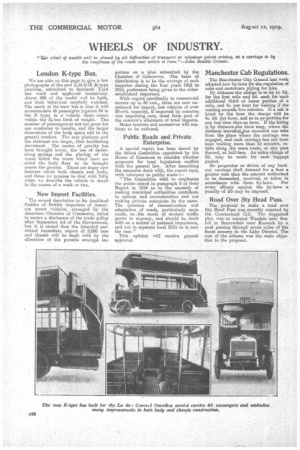
Page 5
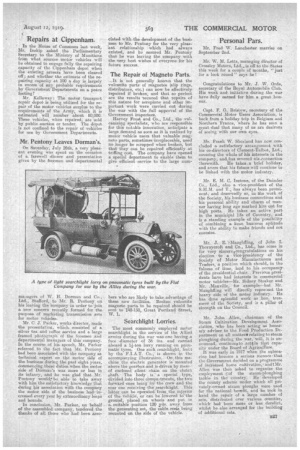
Page 6
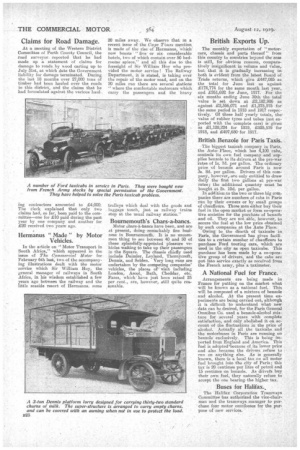
Page 7
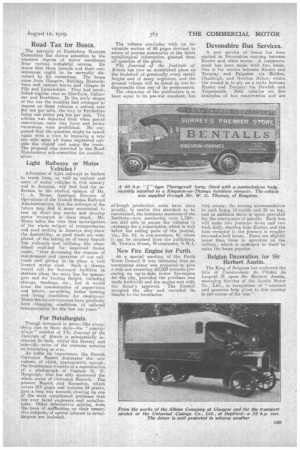
Page 8
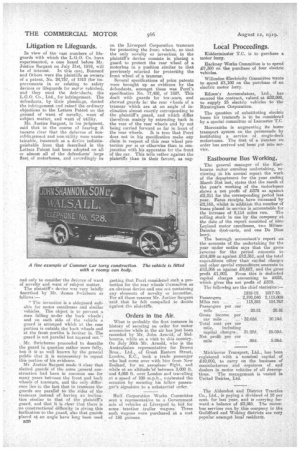
If you've noticed an error in this article please click here to report it so we can fix it.
" Ttirie wheel of wealth will be slowed by all difficulties of transport at whatever _points arising, as a carriage is by the roughness of the roads over which it runs."—John Beattie Grosser.
• London K-type Bus.
We are able on this page to give a few photographs of the new .L.G.o.0 .1i-type onmilins, submitted to Scotland • Yard last week and aprioved tentatively. About 500 of the model .,vi.11 be built, and their behaviour carefully watched. The merit of the new 'LIU'S is that it will accommodate 46 passengers (against 34 in the B type) in a vehicle thatm comes within the 3A-ton limit of weight. The number of passengers.ais not too great for one conductor to handle, and the larger dimensions of the body space add to the general comfort. The rear platform and the staircase are larger, thus facilitating movement. The centre of gravity has been brought lower, the use of underslung springs and the placing of the worm below the worm wheel have enabled the body floor to • be brought nearer the ground. There are many new features about both chassis and body, and these we propose to deal with fully when we describe the vehicle in detail in the course of a week or two.
New Import Facilities.
• The second deputation to Sir Auckland Geddes of British importers of American motor vehicles, arranged by the American Chamber of Commerce, .failed to secure a disclosure of the trade policy after September let of the Government, but it is stated that the intended permitted immediate =port ('.;f 5,000 cars and chassis will be -dealt with by the. allocation of the permits amongst im
porters on a plan submitted by the Chamber of COMMOTCC: The basis of distribution is to be the average of each importer during the four years 1912 to 1915, preference being given to the olderestablished importers. With regard specifically to commercial motors up to 30 cwt., these are now unrationed for import, but vehicles of over 30-cwt. capacity, if imported by concerns also importing cars, must form part of the concern's allotment of total imports.
Motor tractors and accessor!es will continue to be rationed.
' Public Roads and Private Enterprise.
A special report has been issued by the Select Committee appointed, by the House of Commons to consider whether proposals for local legislation conflict with the general law. After describing the measures dealt with, the report says, with reference to public roads:— "The Committee wish to emphasize the points raised in paragraph 8 .of their Report in 1914 as to the anomaly of making municipal authorities contribute to upkeep and reconstruction and not making private enterprise do the same. The question of reconstruction and adaptation of roads, particularly main roads, to-the needs of modern traffic grows in urgency, and should be dealt with as a matter of national importance, and not in separate local Bills as is now the ease."
. This opinion will receive general approval.
Manchester Cab Regulation&
The Manchester City Council last week adopted new by-laws for the regulation of cabs,and,motorcare plying for hire. By distance the charge SS to be L. Gd. for the first mile and 6d. each for each additional third or leaser portion of a mile, and 45. per hour for -waiting if the waiting exceeds five minutes. If a cab is hired by the hour the ehargo will be 4s. 8d. per hour, and so in: proportion for any less time than an hour. If the hiring is by distance the hirer may, where the distance travelled has exceeded one inile from the place where the carriage was engaged, and such carriage has not been kept waiting more than 15 minutes, return along the same route-, or any part thereof, at half-fare. An extra charge of 2d. may be made for each luggage packet. No proprietor OT driver of any hackney carriage shall desnand for a fare a greater sum than the amount authorized to be demanded, received, or taken in
accordance with these by-laws. For every offence against the by-laws a penalty of £5 may be imposed.
Road Over Sty Head Pass.
The proposal to nia,ke a road over Sty Head Pass was recently rejected by the Cumberland C,C. Tho suggested plan was:to connect Wasdale near Scarfell to Borrowdalo near Keswick by a road passing through seven miles of the finest scenery in the Lake District. The cost of the scheme was the main objection to the proposal.
Repairs at Cippenham.
/n the House of Commons last week, Mr. Inakip asked the Parliamentary Secretary to the Ministry of Munitions from 'what sources -motor vehicles will be obtained to engage fully the repairing capacity of the Cippenham depot when the existing 'arrears have been cleared off ; and whether the estimate of the repairing capacity at 100 a day is Largely in -excess of any probable requirements by Government Departments on a peace footing?
Mr. Kellaway : The motor transport repair depot is being utilized for the repair of the motor vehicles surplus to the requirements of the Artily, which it is estimated 'will riumlaer about 80,000. These vehicles, when repaired, are sold by public auction or tender. The depot is not confined to the repair of vehicles for use by Government Departments.
Mr. Pentony Leaves Dorman's.
On Saturday, July ath, a very pleasant evening was spent on the occasion of a. farewell dinner and presentation given by the foremen and departmental
maaagers of W. H. Darman and. Co., Ltd., Stafford, to Mr. R. Pentony on his leaving the -company in order to join a new concern recently formed for the purpose of marketing transmission sets for motor vehicles.
Mr. C. J. Parker, works director, made the presentation, which consisted of a silver tea and coffee service and a large framed photoorapn of the, foremen and departmental managers of this company. In the course of his speech, Mr. Parker referred to the fact that Mr. Pentony had been associated with the company as technical expert on the motor side of the business' during the -past eight years, Commencing these duties when the motor aide of Dorman's was more or less in its infancy, and be was glad that-,Mr. Pentony would„0 be able to 'take -away with him the satisfactory knowledge that daring his association with the company the motor side of the business had..increased every year by extraordinary leaps and hounds.
• In conclusion Mr. Parker, on behalf of the assembled company, tendered.tha thanks of all those who had been asso elated with the development of the business to Mr. Pentony for the very pleas'ant relationship which had always existed, and he assured Mr. ,Pentony that he was leaving the company with the very best wishes of everyone for his future success.
The Repair of Magneto Parts.
• It is not generally known that the vulcanite parts of magnetos (slip rings, distributors, etc.) can now be effectively repaired if broken, and that so perfect are the results -secured that repairs of this nature for aeroplane and other impOrtant work were carried out during the war with the full approval of the Government inspectors.
• Harvey Frost and Co., Ltd., the vulcanizing specialists, who are responsible for this notable innovation, anticipate a large demand as soon as it is realized•by motor vehicle users that valuable magneto parts, sometimes irreplaceable, need no longer be scrapped when broken, but that they can be repaired efficiently •at trifling cost. The company have opened a special department to enable them to give efficient service to the large num •
bers who are likely to take.advantage of these new facilities. Broken vulcanite magneto parts to he repaired should be sent to 148-150, Great Portland -Street, W. 1.
Searchlight Lorries.
The most commonly employe-d motor searchlight in the service of the Allied armies during the war was one having a face diameter of 56 ins, and carried aboard a 1i-ton lorry running on pneumatic tyres. One such searchlight, built by the FLAT. Co., is shown in the accompanying illustration. On this Machine the electric generator is mounted above the gearbox and is driven by meao ; of enclosed silent chain on the clutch shaft. The body is a • special type, divided into three compartments, the two fir-ward ones being 'for the crew and the rear one receiving the searchlight. This latter can be operated from the interior of the vehicle', or can be lowered fri-the ground, placed on wheels and put in a, suitable position 120 ,yels, away_ from the generating set., the cable reeia being mounted on the side of the vehicle.
Personal Pars.
• Mr. Fred W. Lanchester marries on September 2nd;
Mr. W. M. Letts, managing director of Crossley Motors, LteLois off to the States this week for a couple of months, "just for a look round" says he !
Congratulations to Mr. j. W. Orde, secretary of the Royal Automobile Club. His work and initiative during the war have fully earned for him a great honour.
Capt. F. G. Bristow, secretary of the Commercial Motor Users Association, is back from a holiday trip in Belgium and Northern France, where he has seen a great deal that many of its are desirous of seeing with our own eyes.
Mn. Frank AV. Shorland has now concluded a satisfactory arrangement with his co-directors of Clement-Talbot, Ltd., covering the whole of hie interests in the company, and.bas severed nis.connection therewith. He takes brief holiday, and avers that his future will continue to be linked with the motor. industry.
Mr. E. M. C. Instone, of the Daimler Co., Ltd., also a vice-president of the S.M.M, and T. has always been prominent, and deservedly so, in the work of the Society, his business connections and his personal ability and -charm of manner having long ago marked him out for high posts. He 'takes an active part in the municipal life of Coventry, and is a 'standing example of the .possibility of combining a keorr business aptitude yith the ability to make friends and not enemies..
Mr. J. E.':.i.Maughfling, of John I. Thornycraft and Co., Ltd. has came in for very Sincere ;ongratufations On his eleotion to a vice-presidency of the Society of Motor Manufacturers and Traders, a position which should, in the fuluess of time, lead to his occupancy of the presidential chair. Previous presidents have had interests in commercial motor vehicles—Mr. Sidney Straker and Mr. ;Manville, for example-but Mr. Ma-aghtling will directly represent the heavy side of the motor industry. He has done splendid .work as hon. treasurer of the Society, and is a pillar of strength on the Council.
Mr. John Allen, chairman of the Steam Cultivation Development Association, who has been acting as honorary adviser to the Food Production Department on all matter/ relating to steam ploughing during the war, will, it is announced, omrtinueiito act4in that capacity under the Board of Agriculture. It was early in 1917 when the submarine had become a serious menace ...that the Government decided on a programme of increased home cultivation,-and!Mr. Allen was then asked to organize the employment tof the stearnploughing tackle in the •country. He developed the county scheme under which all privately-owned steam ploughs were used for the national benefit, and he took in hand the repair of a large number of sets, distributed over various counties, which had been more or less derelict, whilst he also arranged for the building of additional sets.
Claims for Road Damage.
At a meeting of the Western District Committee of Perth County Council, the road surveyor. reported that he had made up a statement of claims for damage to roads, by wood carting up to July 31st, at which date the Government liability for damage terminated. During the last 18 months over 27000 tons of timber had been hauled over the roads in thi$ district, and the claims that he had formulated against the various haul
log contractors amounted to 24,000. The Clerk explained that only two claims had, so far, been paid to the committee—one for 210 paid during the past year by one company and another for 220 received two years ago.
Herrnanus " Made " by Motor Vehicles. •
In the article on "Motor Transport in South Africa," which appeared in the issue of The Cipmazereled Motor for February 6th last, two of the accompanying illustrations dealt with the motor service which Sir William Hoy, the general manager of railwa.ye in South Africa., in his wisdom established a few years ago between the railway and the little seaside resort of Hermanus, some 20 miles away. We Observe that in a recent issue of the Cape Times mentionk is made of the rise of Hermanus, 'which now boasts " five or six considerable hotels, two of which contain over 50 bedrooms apiece," and all this due to the foresight of Sir William Hoy who provided the motor service ! The Railway Department, it is stated, is taking over the repair of the motor road, and on the 20 miles run there are several stations 'where the comfortable motorcars which carry the passengers and the heavy
trolleys which deal with the goods and luggage touch, just as railway trains stop at the usual railway station."
Bournemouth's Chars-a-bancs.
Motor chare-e-les.nes have been, and are at present, doing remarkably fine business in Bournemouth. It is no uncommon thing to see between 40 and 50 of these splendidly-appointed pleasure vehicles waiting to take up their passengers in the Square. The chassis chiefly used include Daimler, Leyland, Thornycroft, Dennis, and Selclan. Very long runs are undertaken by the competing companies' vehicles, the places of-visit including Loudon, Ascot, Rath, Cheddar, etc. Fares, which' have just been raised 25 per cent., are, however, still quite seasonable.
British Exports Up.
The monthly exportation of "motor:. cars, chassis and paetes thereof" from this country to countries beyond the seas is still, for obvious reasons, comparatively insignificant in volume and value, but that it is gradually increasing in both is evident from the latest Board of Trade returns, which give 2447,085 as the total for June last as against 2174,774 for the same month last year, and 2261,692 for June, 1917. For the six months ending June 30th the total value is set down at 22,182,986 as against, 22,356,071 and 21,275,975 for the same period in 1918 and 191.7 respectively.Of these half yearly totals, the' value of rubber tyres and tubes (not exported with the complete cars) is given as 21,128,224 for 1919, 2625,519 for 1918, and 2497,680•for 1917.
British. Benzole for Paris Taxis.
The biggest taxicab company in Paris, the Auto e Place, which has 4,100 cabs, control its own fuel company and supplies benzele to its delvers at the pre-war rates of le. 7d. per gallon. The ordinary price of benzoic:. around Paris is now 3s. 8d. per gallon. Drivers of this company, however, are only entitled to draw daily the. first two gallons at pre-war rates; the additional quantity must be bought at 2s. 101 per gallon. In addition to the two or three big cam. panies there are numbers of cabs in Paris run by their owners or by small groups of chauffeurs. These men either buy their fuel in the open. market or form co-operative societies for the purchase of benzoic., and oil. They are not able, however, to secure the fuel at the low price Obtained by such companies at the Auto Place.
Owing to the dearth of taxicabs in Paris, the Government has given facilities to a certain number of chauffeurs to purchase Ford touring cars, which are used in the city as open taxicabs. This purchase has been made by a co-operative group of drivers, 'and the cabs are put into service exactly as received from the French army, plus a taximeter.
A National Fuel for France.
Arrangernente are being made in France for putting on the market what will be known as a national fuel. This will be composed of a mixture of beuzole and alcohol. At the present time experiments are being carried out, although it is difficult to understand what new data can be desieed, for the Paris General Omnibus Co. used a hew...Die-alcohol mixture for several years with complete satisfaction, and only abolished it on account of the fluctuations in the price of alcohol. Actually all the taxicabs and the motorbuses in Paris are running on benzoic!. exclusively. This is being imported from England and America. This fuel is adopted'because of its lower price and also because. the drivers refuse to run on anything else. As is generally known, there is a local tax on all motor feel brought into the city of Paris; this tax is 20 centimes per litre of petrol and 15 centimes on benzoic. As drivets buy their own fuel, they naturally refuse to accept the one bearing the higher tax.
Buses for Halifax..
The Halifax Corporation Tramways Committee has authorized the vice-chairman and the tramways manager to purchase four motor ornnibuees for the purpose of new services.
Road Tax for Buses.
The surveyor of Perthshire Western Committee has drawn attention to the constant ingress of motor omnibuses from various industrial centres. He states that these inroads and their consequences ought to he earnestly discussed by his committee. The buses come from Glasgow, Stirling Bannockburn and various towns and villages in Fife and Lanarkshire. They had established regular runs to Aberfoyle, Callender and Dunblane. In the early stages of the war the counties had arranged to impose on these vehicles a certain rate per ton per mile, the levy in Perthshire being one penny pee, ton per mile. The scheme was departed from when petrol restrictions came into force and motor excursions were prohibited. He ruegusted that the question might be raised again with a view to imposing a rate per mile upon all buses registered outside the countq and usingthe roads. The proposal was remitted to the Road Maintenance sub-committee for consideration.
Light Railways or Motor Vehicles ?
Advocates of light railways as feeders to trunk lines, as well as makers and users of motor vehicles in this country end in America, will find food for reflection in the studied opinion of Mr. C. A. Morse, Assistant Director of Operations of the United States Railroad -Administrations, that the railways of the future may find it more economical to tear up short line tracks and develop motor transport in their stead. Mr. Morse takes the view that investigation of the whole subject of transportation and road making in America may show the desirability, as good roads are completed, of the taking up of Many branch line railroads and utilizing the abet).&Med road-bed for improved 'motor roads, "thus decreasing the expense of maintenance and operation ofour railroads and giving in its place a well .1ccated motor road. . Such achange would call for increased facilities at stations along the main line for passengers and for hauling freight, including storage, trackage, etc., but it would mean the concentration of supervision and labour, permitting better housing and living conditions for employees. Motor-driven conveyances have gradually been changing conditions of railroad transportation for the last ten years."
For Metallurgists.
Though increased in price—like everything else in these days—the " comingof-age" number of The Journal af Me Inntiute of Metals is substantially increased in bulk, whilst' the literary and scientific value of the contents remains, as interesting as ever.
• As befits its importance, the Fourth Corrosion Report dominates tbe new volume, of which, appropriately enough, the frontispiece consists of a reproduction .f a photograph of Captain G. D. Bengough, who has ably sponsored the whole series of Corrosion Reports. The present Report and discussion, which covers 215 pages and includes 24 plates, goes a long way towards clearing up one of the most complicated problems that has ever faced engineers and metallurgists. Other informative articles, from the pens of autlilorities on their respective subjects, of special interest to metallurgists are included. The volume concludes with an invaluable section of 60 pages devoted to scores of concise summaries of the latest metallurgical information gleaned from all quarters of the globe. The Journal of the lltstitute of Metals has now an established place on the bookshelf of practically every metallurgist and of many engineers, and the present volume will be found no less indispensable than than any of its predecessors. The character of the publication is at least equal to its pre-was standard, but although production costs have risen greatly, to enable this standard to be maintained, the fortunate members of the Institute--now numbering over 1,150— are still able to secure the volumes in exchange for a subscription which is well below the selling price of the journal, viz., 31s. 6d. to non-members, tly \chen it can be obtained from the publishers, 36, Victoria Street, Westminster, S.W.1.
New Fire Engine for Perth.
At a special meeting of the Perth Town Council it was intimated that an anonymous donor was prepared to give a sum not exceeding £2,000 towards procuring an upeto-date motor fire-engine for the city, provided the purchase was made forthwith and the engine met with the donor's approval. The Council accepted the offer and recorded ita thanks to the benefactor. A new service of buses has been started in Devonshire running between Exeter and other towns. A commencement has been made with two buses. One is for service between Exeter and Torquay and Paignton via Haldon, Chudleigh, and Newton Abbot, whilst the second is to ply on a route between Exeter and Torquay via Dawlish and . Teignmouth. Both vehicles are fine examples of bue construction and are
very roomy, the seating accommodation. in each being 16 inside and 24 on top, and in addition there is space provided for the conveyance of parcels. Each bus will make two journeys down and two bark daily, starting from Exeter, and the time occupied in the journey is roughly two-and-a-half hours. Fares are slightly lower than those in operation on the railway, which is sufficient in itself to make the buses popular.
Belgian Decoration for Sir Herbert Austin.
The King of Belgians has conferred the title of Commandeur de l'Ordre de Leopold II upon Sir Herbert Austin, managing director of the Austin Motor Co., 'Ltd.,. in recognition of " constant and generous help given to this country in tir6 course of the war."
Litigation re Lifeguards.
In view of the vast numbers of lifeguards with which the L.G.O. Co.-have experimented, a case heard before Mr. Justice Sargent on July 31st, 1919, will be of interest. In this cases, Bonnard and Others were the plaintiife as owners of a patent, No. 24,757, of 1912 (for improvements in or relating to safety devices or lifeguards for meter vehicles), and they sued the defeedante, the L.O.O. Co., Ltd., for infringement. The defendants, by their pleadings, denied the infringement end raised the ordinary objections to the Letters Patent on the ground of want of novelty, want of subject matter, and want of utility.
Mr. Justice Sargent, in Ins judgment, said that in the course of hearing it became clear that the defences of noninfrineemeat and non-ueility were unsnstaMable, inasmuch as a device indistinguishable from that described M the Letters Patent had been adopted on all or almost all of the defendants' large fleet of motorbuses, and ecrordingly he nad only to eonsider the defence of want of novelty and want of gasket matter.
The plaintiff's device was' very briefly ieseribed by Mr. -James Swin burn tie follows ". The invention is a sideguard suitable for motor omnibuses and similar vehicles. The. object is to prevent a Man falling under the back wheels.; and on each side of the .vehicle a guard is arranged which 'at the .rear portion is outsides the back wheels end at the front portion is further in. The guard is not parallel but tapered out."
, Mr. Swinburne proceeded to describe the guard, in question rather more fully, but it is eo well known by the general public that it is unnecessary to repeat this Portion of his evidence.
Mr. Justice Sargent made it clear that sleeted guard e of the e.ame eeneral construction had been in Common use for many years between the front and back wheels of tramcars, and the only differ-sore lies in the fact that in tramcars the guards are parallel to the eidee of the tramcars instead of having an inclination 'similar to that of the plaintiff's guard, and that it is clear that there is no constructional difficulty in giving this inclination to the guard, also that guards placed at an anglehave long been used
rt30
on the Liverpool Corporation tramcars for protecting the freers wheek, so that the only novelty or invention in the plaintiff's device consists in placing a guard to protect the rear wheel of a motorbus in a position siniiiar to that previously selected for protecting the front wheel of a tramcar.
Several specifications of prior patent were brought up as evidence by the defendants, amongst these was Porn's specification No. 17,480, of 1887. This dealt with guards for tra.sicars, and showed guards for the rear v'heels of a tramcar which are at an angle of inclination almost exactly corresponding to the plaintiff's guard, and which differ therefrom mainly by extending back in the rear of the rear wheels and by not being carried forward so far in front of
the rear wheels. It is true that Perri does not in his specification make any claim in respect of this rear wheel protection per as or otherwise than in conjunction with his apparatus for the front of the car. This tells rather against the plaintiffs than in their favour, as sug
gesting that Porn i considered such a protection for the rear wheels themselves as an obvious device and one not containing any elements of novelty or invention. For all these reasons Mr. justice Sargent said that he felt compelled to decide against the aleintiffs.
Orders in the Air.
What is probably the first instance in history of securing an order for motor accessories while in the air has just been recorded by Mr. John serneki, of Melbourne, while on a visit to this country. On July 30th Mr. Arnold, who is the Australasian representative for Brown These., Ltd., of Great Eastern Street, Londen, E.C., took a trade passenger who had corns over with him from New Zeeland, for an aeroplaneTighe, and while at an altitude. of between 3,000 ft. and 4,000 ft. over London and travelling at a speed of 100 m.p.h., celebrated the occasion by securing his fellow passenger's signature to a substantial order.
Hull Corporation Works Committee sent a representative to a Government sale of vehicles at Liverpool to bid .for some trectimi .trailer wagons. Three such wagons were purchased at a cost of 158 guineas.
Local Proceedings.
Kidderminster T.C. is to purchase a motor lorry.
Uackney Works Committee is to spend £7,300 on the purchase of four electric Vehicles,.
Willesden Electricity Committee wanes to spend £1,100 on the purchase of an electric motor lorry.
Edison's Accumulators, Led. has secured the contract, valued at £52,000, to supply 25 electric vehicles to the Birmingham Corporation.
The question of substituting electric buses for trameats is to he considered by a special committe.e of Lancaster T.C.
Morecambe is augmenting its horse transport system on the promenade by instituting a service of, single-deck motorbuses. The first of a number On order has arrived and been put into service.
Eastbourne Bus Working.
The general manager of the Eeets bourne motor omnibus undertaking, 'reviewing in his anneal report the work of the department for the year ending March 31st last, states that the result of the year's workbag of the motorbuses shows a net Profit of £379 as againtt .£2,211 for the corresponding period last year. Fares receipts have increased by
• R2,168, whilst in addition the number of buses placed in service is accountable for the increase of 9,114 miles run. The rolling stock in use by the company at the date of the report consiated of nine Leyland motor omnibuses, two MimesDaimler dust-carts, and one De Dion lorry.
The borough accountant's report on the accounts of the undertaking for the year ender notice says that the gross revenue for the period amounts to £14,809 as against £12,361, and the total expenditure other than capital charges end other special expenditure amounts to £13,806 as against 29,687, and the gross profit £1,002. From this is deducted capital charges amounting to £623, which gives the net profit of £379. The following are the chief statistics: 191849. 1917-18.
Passengers ... 2,570,040 2,115,009 Miles run ... ... 115,881 104.767 Passengers per car mile 20.81 20.81 Gross income per car mile ... 32.62d. 30.14d. Total cost per car mile, including capital charges.. 31. 82e1 . 25.08d. Net profit per car mile .80d. 5.06d.
Miekleover Transport, Ltd., has been registered with a nominal capital of £10,000, to carry on the business of manufacturers and repairers of and dealers in motor vehicles of all descrip
tions. The management is vested in
United Dairies, Ltd. .
The Aldershot and District Traction Co., Ltd., is paying a dividend of 10 per cent, for last year, and is .carrying forward. a balance of £2,861. . The motorbus services run by this company in the Guildford and Woking districts are very popular amongst local residcetr.
























